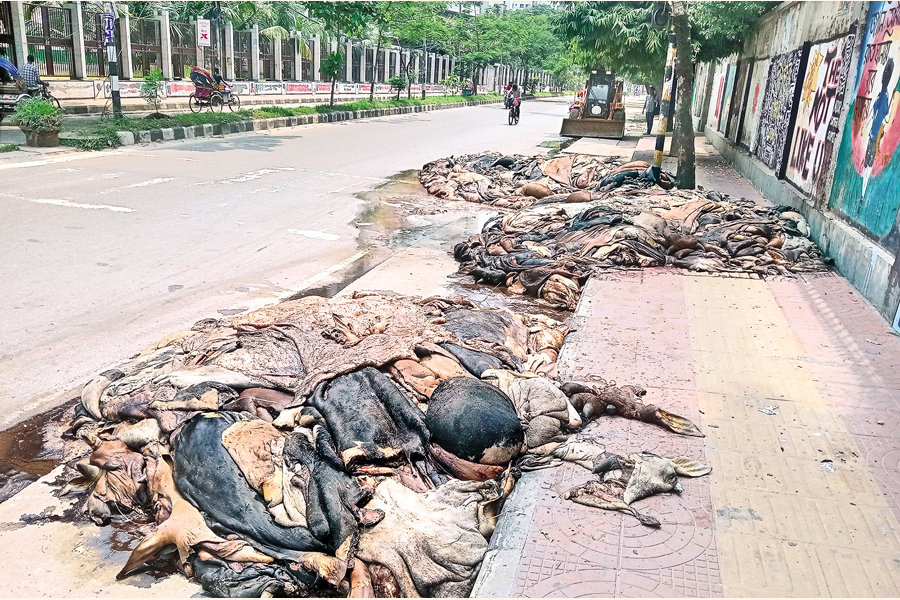
Published :
Updated :

 An expected bonanza out of rawhide business eluded seasonal traders this Eid-ul-Azha as prices of hides and skins of sacrificial animals hovered around 30-40-percent down the government-fixed minimum retail price (MRP).
An expected bonanza out of rawhide business eluded seasonal traders this Eid-ul-Azha as prices of hides and skins of sacrificial animals hovered around 30-40-percent down the government-fixed minimum retail price (MRP).
The government had set cowhide prices at Tk 1,350 in the capital and Tk 1,150 outside or Tk 60-65 per square foot, up from Tk 55-60 the previous year.
Aminur Rahman, a seasonal trader from Keraniganj, close by the leather hubs in the capital, Dhaka, procured over 200 cowhides in the first two days of the Eid fiesta (June 7-8) in anticipation of good returns.
On June 9, he arrived at Posta -- the key rawhide-trading hub in Dhaka's Lalbagh area -- to sell the hides to arathdars (wholesale merchants). His hopes begin fading out as he fails to make a reasonable deal -- merchants offer prices lower than he spent for inclusive of transport bill.
"I bought large-size cow skins for Tk 1,000 and medium ones at Tk 600-650. However, the hide merchants are offering Tk 750-800 for bigger one and Tk 500-600 for medium-sized," says Rahman.
He alleged merchants were showing lame excuses for not offering them reasonable prices.
After driving hard bargains with several merchants for better price, he had to sell them at a discounted rate, losing out Tk 12,000.
Experiences of most other seasonal traders were the same across the country this Eid-a sluggish rawhide trade, notwithstanding government intervention.
Like Mr Rahman, many seasonal traders, who eyed on some brisk business, have either incurred loss or made a narrow escape.
Meanwhile, goatskins became a burden for seasonal traders as many of them collected those without being informed of the price.
One trader of Dhaka's Rayerbazar-beribadh area, Amjad Mia, says he collected nearly 300 goatskins, mostly free of cost, as well as at Tk 5.0 to Tk 10 per piece in cases.
"Despite getting the goatskins free of cost, I had to spend money for transportation. Now merchants are not accepting them saying that few local tanneries could process goatskin," adds Mr Mia.
He could sell nearly a hundred pieces to a merchant while he had to discard the rest into the dustbin.
The Commerce Ministry fixed the prices for sacrificial animal hides two weeks ago.
In Dhaka, salt-applied cowhide was priced Tk 1,350, while outside the capital, it was Tk 1,150 (Tk 60-65 per square foot, up from Tk 55-60 the previous year).
The minimum price of salted hide of castrated goats was set at Tk 22-27 per square foot and a regular goat hide at Tk 20-22.
A rawhide merchant of Posta in the city, Riaz Uddin, told the FE that they could not follow the rates fixed by the government as they were not pragmatic.
"The rates applied to the salt-treated hides were not recognised well by many seasonal sellers," he said.
"We have to spend additional Tk 300- Tk 400 on cowhide after purchasing from the seasonal sellers," he said, explaining that the cost includes salt, labour, processing and transportation.
Mr Uddin, who collected 1100 cowhides and 2,000 goatskins this year, also said when they would sell the rawhides to tanneries, nearly 30 per cent would be identified as lacking in quality.
"Undesired cuts and skin disease are major reasons for not accepting all the hides," he said.
Traders at Posta said they had collected nearly 80,000 rawhides until Monday .
According to the Department of Livestock Services (DLS), 12.4 million cows and goats were prepared for sacrifice this Eid.
Tannery owners have set a target of collecting 8.0 to 8.5 million pieces of hides during the current Eid-ul-Azha season.
Senior Vice-president of Bangladesh Tanners Association (BTA) Shahkawat Ullah says that, this year, there is a higher quantity of small and medium cowhides.
He claims overall leather supply is good and the price per hide is Tk 100 to Tk 150 higher compared to last year's.
"This year, tanneries aim to procure nearly 1.0 million raw hides to stabilise the market," he says.
Meanwhile, Industries Adviser of the interim government Adilur Rahman Khan has said delayed salting has caused a shortfall of expected prices for sacrificial-animal hides this Eid-ul-Azha, leaving many sellers "disappointed".
"The interim government had supplied 30,000 tonnes of salt, but in some areas, rawhides were not salted properly or in time, resulting in damage and loss in value," he made the remark at a meeting with the tannery owners in Savar tannery industrial zone.
He said 0.378 million hides from sacrificial animals arrived at the Savar tannery industrial zone so far.
Another 0.75 million pieces from Dhaka and elsewhere in the country were expected to be delivered to factories at the estate within the next few days.
tonmoy.wardad@gmail.com, saif.febd@gmail.com


 For all latest news, follow The Financial Express Google News channel.
For all latest news, follow The Financial Express Google News channel.